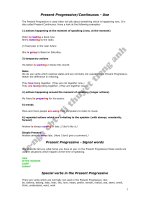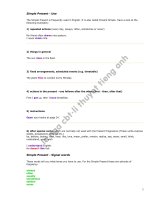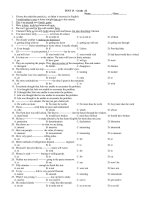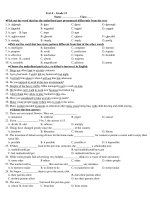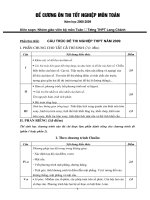Lí thuyết cơ bản ôn thi tốt nghiệp 2009 - simple present
Bạn đang xem bản rút gọn của tài liệu. Xem và tải ngay bản đầy đủ của tài liệu tại đây (133.55 KB, 4 trang )
Simple Present - Use
The Simple Present is frequently used in English. It is also called Present Simple. Have a look at the
following examples:
1) repeated actions (every day, always, often, sometimes or never)
My friend often draws nice posters.
I never drink milk.
2) things in general
The sun rises in the East.
3) fixed arrangements, scheduled events (e.g. timetable)
The plane flies to London every Monday.
4) actions in the present - one follows after the other (first - then, after that)
First I get up, then I have breakfast.
5) instructions
Open your books at page 34.
6) after special verbs, which are normally not used with the Present Progressive (These verbs express
states, possessions, feelings etc.)
be, believe, belong, hate, hear, like, love, mean, prefer, remain, realize, see, seem, smell, think,
understand, want, wish
I understand English.
He doesn't like fish.
Simple Present - Signal words
These words tell you what tense you have to use. For the Simple Present these are adverbs of frequency:
always
often
usually
sometimes
seldom
never
1
Other phrases of time can occur, like:
every day
every week
every year
on Mondays
after school
Form of the Simple Present
We use the infinitive of the verb. In the 3rd person Singular (he, she, it - or a name) we put an -s at the
end of the infinitive.
infinitive - 3rd person Singular (he, she, it) infinitive + -s
Affirmative sentences:
I/we/you/they play football.
He/she/it plays football.
NOTE: he, she, it - Do not forget the -s.
Negative sentences:
We use the auxiliary do.
I/we/you/they do not play football.
He/she/it does not play football.
NOTE: We often use short forms in negative sentences in the Simple Present:
I/we/you/they don't play football.
He/she/it doesn't play football.
Questions:
Do I/we/you/they play football?
Does he/she/it play football?
Simple Present - Spelling
Be careful with some words when using the 3rd person singular.
1) verbs ending in a sibilant [s] [z] [ʃ] [ʒ] [ʧ] [ʤ] or verbs ending in -o preceded by a consonant
We add -es to the infinitive.
Examples:
I watch - he watches
I pass - he passes
I go - he goes
I do - he does
2
2) verbs ending in -y
verbs ending in 'y' preceded by a vowel (a, e, i, o, u): Add -s.
Example:
I play - he plays
verbs ending in 'y' preceded by a consonant: Change 'y' to 'ies'.
Example:
I hurry - he hurries
Special verbs in the Simple Present
1) have as a full verb
affirmative sentence negative sentence question
I, we, you, they:
I have a book. I do not have a book. Do I have a book?
he, she, it:
He has a book. He does not have a book. Does he have a book?
2) be as a full verb
affirmative sentence negative sentence question
I am from Britain. I am not from Britain. Am I from Britain?
he, she, it:
He is from Britain. He is not from Britain. Is he from Britain?
we, you, they:
We are from Britain. We are not from Britain. Are we from Britain?
We often use the short forms with this verb.
3) do as a full verb
affirmative sentence negative sentence question
I, we, you, they:
I do an exercise. I do not do an exercise. Do I do an exercise?
he, she, it:
He does an exercise. He does not do an exercise. Does he do an exercise?
4) modal auxiliaries can, could, may, must, need, will etc.
affirmative sentence negative sentence question
every time regardless the subject (I, he, she, it, we, you, they):
3
I can play tennis. I cannot play tennis. Can I play tennis?
NOTE:
We can subtitute don't (can't) for do not (cannot).
Modals have the same form every time regardless the subject. We do not add an -s to the infinitive.
4


